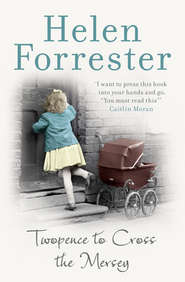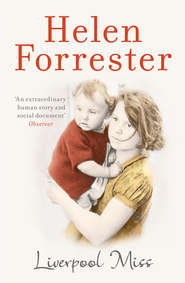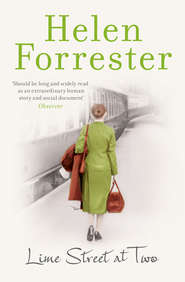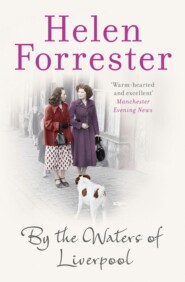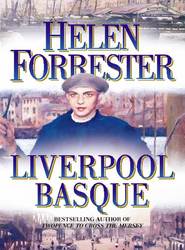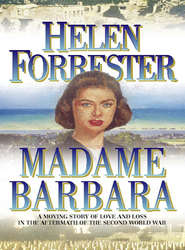По всем вопросам обращайтесь на: info@litportal.ru
(©) 2003-2024.
✖
The Complete Helen Forrester 4-Book Memoir: Twopence to Cross the Mersey, Liverpool Miss, By the Waters of Liverpool, Lime Street at Two
Настройки чтения
Размер шрифта
Высота строк
Поля
A pretty lady teacher came hurrying towards the gate. When she saw Fiona she smiled at her through the veil of her smart, little hat.
‘Good morning, Fiona. I am glad to see you back. Are you feeling quite well again now? Alan told me that you were in hospital.’
She ran her eyes over Fiona’s thin, underclothed body and returned Fiona’s angelic, worshipping smile. Then she looked at me in a puzzled fashion. A question trembled on her lips.
Fiona had been brought up properly and she immediately said politely, ‘Miss Brough, may I introduce my elder sister, Helen, and this is Avril and this is my baby brother, Edward.’
Miss Brough’s brow cleared.
She said, ‘How do you do.’
I murmured, ‘Very well, thank you.’
‘I don’t remember you going through our school, my dear,’ she remarked to me. ‘You must have left before I came – I have only been here three years.’ She chucked Edward under the chin with a finger clothed in good brown leather. Then she looked at me again, more sharply. ‘But that is not possible – you are quite young.’ She laughed. ‘You must have gone to school somewhere else.’
My tongue clove to the roof of my mouth and I could not answer.
Fiona said brightly, ‘She used to go to our old school. She has never been to school in Liverpool.’
‘Haven’t you, my dear?’
‘No, Miss Brough.’
I was nearly tongue-tied with fear of what my parents would say if they found out about this conversation.
She was looking at me keenly now, and must have seen the stark fright in my eyes. She pursed her delicately painted lips, and said, ‘Well, never mind. Fiona, hurry up or you will be late.’
The school bell began to ring and she smiled reassuringly at me and said, ‘Goodbye. Goodbye, Avril and Edward.’
‘Goodbye,’ I muttered through clenched teeth.
My legs were shaking so much that I could not start the pram. I watched her disappear through the school’s ornately carved doorway before, at last, I could make my feet move.
I said nothing to my parents.
A week later a school attendance officer called upon my parents while I was out. How they evaded being prosecuted and sent to prison for my long truancy I will never know. Perhaps their calm authoritative manners made even school attendance officers quail. My immediate attendance was, however, ordered.
I faced two outraged parents every day for the next six weeks until my fourteenth birthday. The day after that, I was back home again looking after Edward.
I had never been to an elementary school, and I found myself far ahead of the other children in the class in everything except mathematics. It was, however, bliss to hold a pencil in my unaccustomed fingers and to try my wits against the work put before me.
This school had a new and enthusiastic drawing-master. He had to teach children who, for the most part, hardly knew that artists created pictures, and he had only pencils, paper and pastel crayons with which to work, but at my first lesson he did his utmost to explain perspective to the disinterested class.
‘Any questions?’ he asked.
While the rest of the class stared at him glumly, I put up my hand.
‘Could you explain why medieval pictures often look so alive and real though they have no perspective?’ I asked hopefully.
The class turned round in a body and stared at me open mouthed. The teacher’s Adam’s apple bobbed up and down as he sought to reply to me.
Finally, he answered me briefly and then set the class the task of drawing a picture of mountains and roads.
He came and sat on the bench beside me and examined my work. He looked carefully at the little picture and suggested a technical method of improving the texture of the shading in it, while I sat in frozen silence beside him afraid that I would smell abominable to him.
‘I should like you to draw me one or two more, as homework,’ he said at last ‘You can sketch anything which takes your fancy. I want to see what you can do.’
Breathless with excitement, I said I would like to do the drawings but I had neither paper nor pencils.
He smiled and said calmly, ‘I can provide you with them.’
I sat on the steps for several evenings, Edward crawling at my feet, while I sketched the life of the street and a picture of Avril, who was hugely flattered at having a drawing made of her.
A week or two later, the drawing-master expressed his approval of my work and produced a small examination paper for me to work my way through. The paper, with my drawings, vanished into officialdom.
‘There is a scholarship available at the City School of Art,’ he explained kindly to me, ‘and I have put you in for it’
I was happy. For the first time in two years I played with other girls, and I was being taught, though in a rough-and-ready manner. Nobody wanted to sit by me because I was so disgustingly dirty, even by the low standards prevalent in the neighbourhood, but in the open school yard I played tag and skipped until my limited strength gave out.
My fourteenth birthday passed, and my parents put an end to my little holiday. I wept and raged, but to no purpose. I was wanted at home, and Father thankfully turned over Avril and Edward to me again.
Although I had played with other girls at school, I had found nothing in common with them. They had a hearty vulgarity of speech and manner which made me recoil from them and, to them, a girl who spoke as if she had ollies in her mouth was very suspect A small group of girls who were better behaved and came from better homes regarded me with undisguised horror.
I was back where I had started from, pushing Edward’s Chariot to and from the shops or the park, and without any hope of bettering myself.
During the summer holidays, I took all the children to the parks to play, and sat wistfully amongst stout mothers in black shawls, watching my little charges play just as they did. The children accepted me as just another ‘Mum’ and I was too shy to ask if I could play too.
September saw the children back at school again. I watched them go with envy. Now I was over fourteen I could not hope for further education.
CHAPTER TWENTY-THREE (#ulink_02b63354-adbc-521e-af9b-025cd678364f)
Alan and I sat huddled together on the front step. The October evening was cold and clammy; yet we were reluctant to go into the stuffy house. The gaslamps’ light gleamed softly on the damp pavement and women hurried by, their black shawls held tightly round them, their children whining at their heels. Three young men lolled against the iron railings of the corner house; their noisy laughter mingled with that from the public house on the corner opposite to them. Maurrie, the second-hand clothes man, shuffled by with a sack on his back.
An Irish woman plodded stolidly up the street. Near us, she stepped out into the middle of the street and turned, to take up a belligerent stance facing the front steps of the house opposite.
She was a scarifying-looking person, hugely fat with legs like wool-clad pillars. Her hair was parted across her head from ear to ear and the back part had been plaited and made into a neat bun; the front hair had been parted again down the middle and plaited forwards, the resulting braids being draped down either side of her face and under her ears, to be fastened at the back. The result was outlandishly fierce-looking to anyone unaccustomed to the Victorian hair-styles of some Liverpool Irish women. She smoothed down her white apron over her black skirt, wrapped her black, crocheted shawl around her and folded her enormous arms. Then, gathering her breath until her purple cheeks stood out like balloons, she opened her mouth and screamed.
‘Yer pack o’ bloody whores!’ she yelled at the house Miss Sinford called The House of Sin. ‘I’ll show yer! Taking a decent woman’s hoosband.’
A crowd materialized from nowhere.
‘Go it, Ma!’ shouted one of the young men from the corner.
There was a flutter of sniggering laughter from the crowd and a murmur of encouragement.
A frail-looking, middle-aged woman, her bare legs thick with varicose veins and her feet shoved into ancient carpet slippers, was unwise enough to open the door and appear on the steps before her.
‘You’d better stop that,’ she shouted, ‘or I’ll call a copper.’






